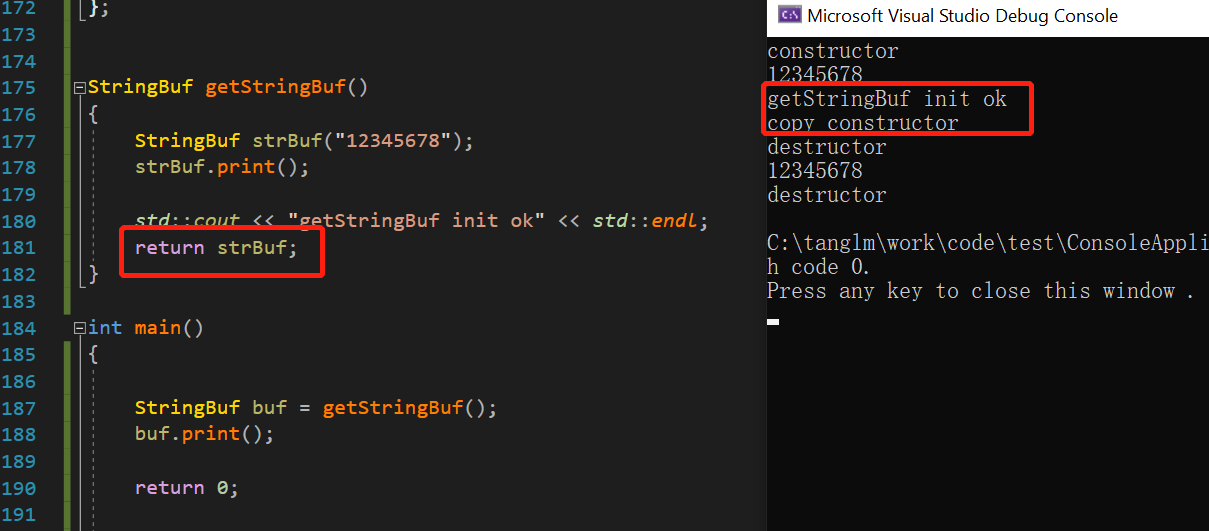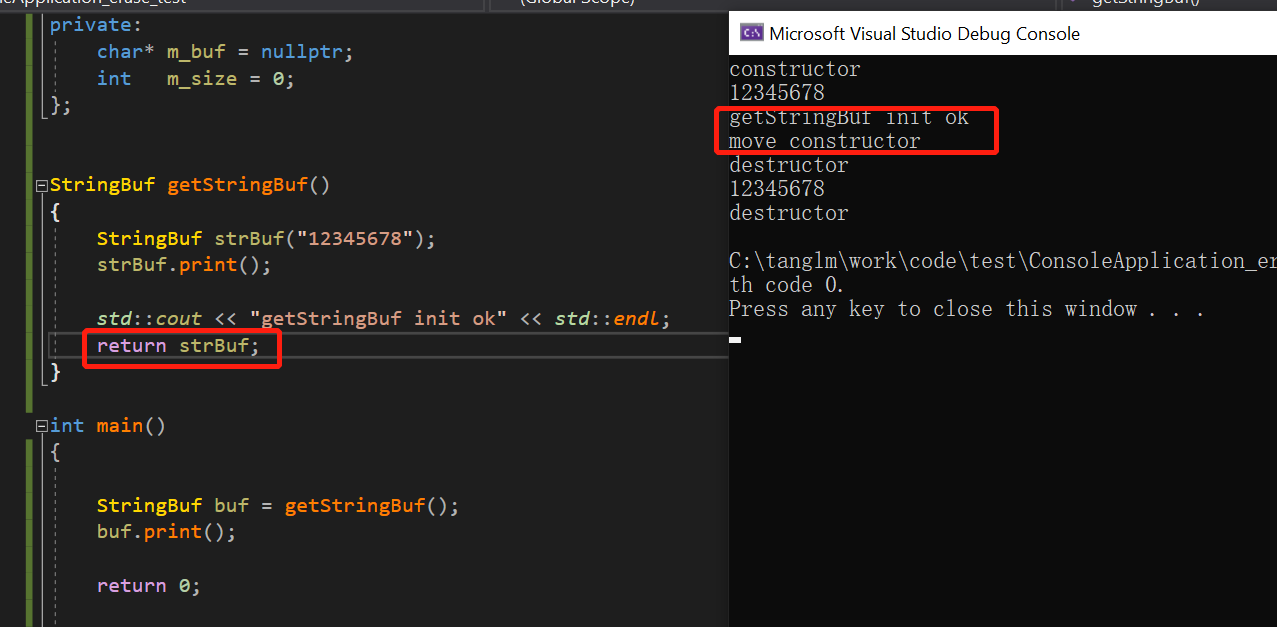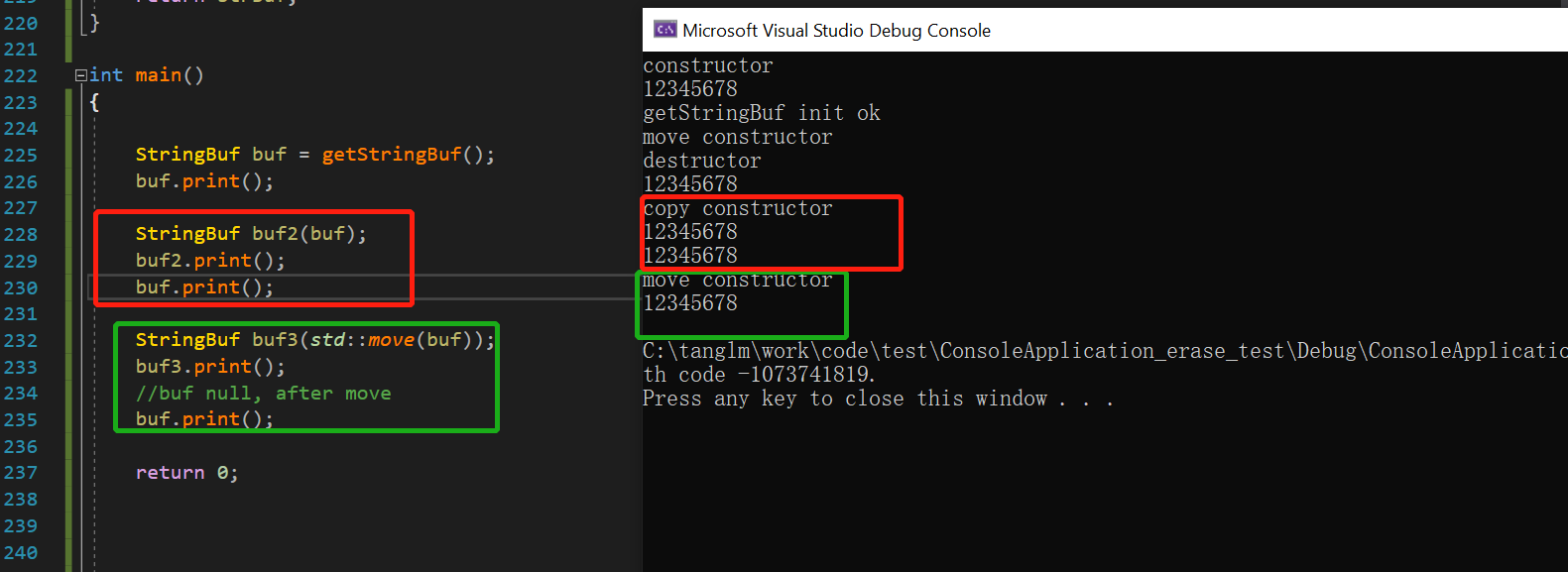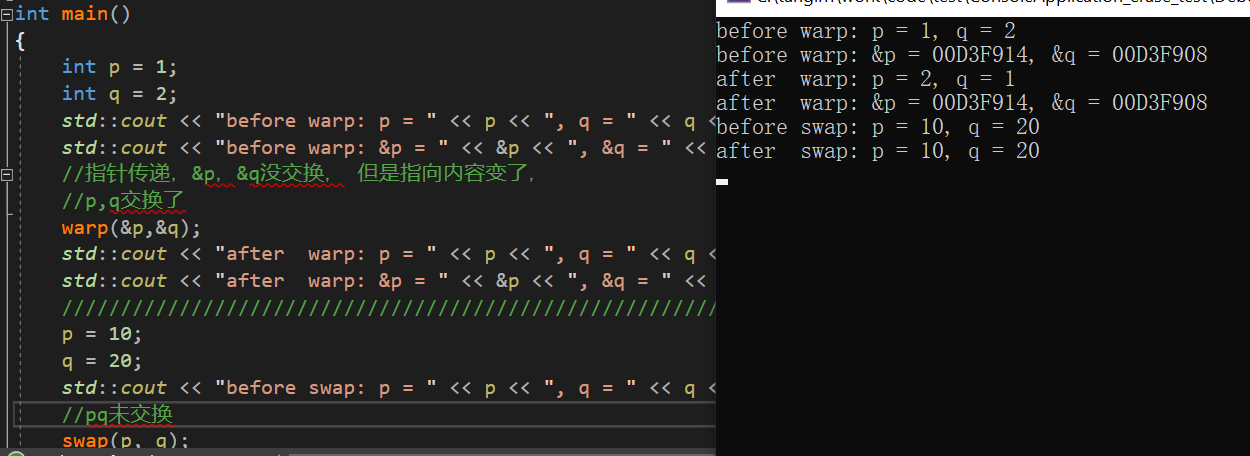1. 请写出 BOOL flag 与“零值”比较的 if 语句
if ( flag )
if ( !flag )
请写出 char *p 与“零值”比较的 if 语句
if (p == NULL)
if (p != NULL)
2. 请写出 float x 与“零值”比较的 if 语句
const float EPSINON = 0.00001;
if ((x >= - EPSINON) && (x <= EPSINON)
3. 以下为Windows NT下的32位C++程序,请计算sizeof的值(10分)
char str[] = “Hello” ;
char *p = str ;
int n = 10;
请计算
sizeof (str ) = 6
sizeof ( p ) = 4
sizeof ( n ) = 4
void Func ( char str[100])
{sizeof( str ) = 4
}
void *p = malloc( 100 );
sizeof ( p ) = 4
void Func(char str_arg[100])
{
printf("%d\n",sizeof(str_arg));
}
str是复合类型数组char[6],维度6是其类型的一部分,sizeof取其 维度*sizeof(char),故为6;
int a[5]={1,2,3,4,5};
sizeof(a)=20
sizeof *a=4;
a为含有5个元素的数组,数组名代表元素的首地址,所以sizeof(a)代表整个数组所占的内存空间,即5*4Byte=20Byte;
而*a表示指向首地址,即表示首地址的内容,所以sizeof(*a)表示首元素所占内存空间的大小
//扩展
|
Type |
ILP32 |
LP64 |
|---|---|---|
|
char |
1 |
1 |
|
short |
2 |
2 |
|
int |
4 |
4 |
|
long |
4 |
8 |
|
long long |
8 |
8 |
|
pointer |
4 |
8
|
枚举:联合体:
union a{int a;char b;float c;};
由于联合体公用储存空间,所以只取最大的来计算联合体占用空间,这里sizeof(a)==4;
enum a{ Monday, tuesday, Wensday, Thirsday, Friday, Saturday,Sunday}
sizeof(a) = 4;
如果显示表明了枚举类型是char 或者 short,是按照char or short来算的,否则默认是int
结构体:
比较麻烦,注意3点:
1,首地址应为结构中最宽成员的倍数,首成员都是0
2,整个结构体长度应为最宽成员的倍数
3,把单一元素看成结构体
如,
struct a{double a;char b;int c;};
sizeof(a)==16;
这里,
先分配double,首地址为8的倍数0,
再分配char,这时其偏移量为8,为1的倍数,
再分配int,其偏移量为9,不是4的倍数,应该用3个空字节补齐,所以int的偏移为9+3=12,再加上4=16,这时16为最宽成员8的倍数,所以该结构体的长度为16。
当结构体中包含结构体时,最宽成员不包括内部结构体,最宽成员应从这两个结构体的基础成员中去找。
struct A{char a;int b;};
sizeof(A)==8;
sturct B{char a; A b;char c};
sizeof(B)==16;
把内部结构体打开来看,
分配char为1,
再分配A,A中最宽成员为4,则其起始偏移应为最宽的倍数,1+3=4,4+8=12,
再分配char,这时,其偏移为12,是char的倍数,12+1=13,根据规则2,再用3来补齐,13+3=16,是int的倍数,所以结构体B的长度为16.
类的sizeof大小
1,空类大小为1
2,虚函数大小为4,构造析构不算大小
3,类大小等于所有数据成员大小之和
4,继承中类大小等于父类和子类的数据成员大小之和
4. 头文件中的 ifndef/define/endif 干什么用?
防止该头文件被重复引用
5. #include <filename.h> 和 #include “filename.h” 有什么区别?
对于#include <filename.h> ,编译器从标准库路径开始搜索 filename.h
对于#include “filename.h” ,编译器从用户的工作路径开始搜索 filename.h
6. const
1. 可以定义 const 常量
2. const可以修饰函数的参数、返回值,甚至函数的定义体。被const修饰的东西都受到强制保护,可以预防意外的变动,能提高程序的健壮性
7. 在C++ 程序中调用被 C编译器编译后的函数,为什么要加 extern “C”?
C++语言支持函数重载,C语言不支持函数重载。
函数被C++编译后在库中的名字与C语言的不同,c不带参数,c++通过带参数区别重载
假设某个函数的原型为: void foo(int x, int y); 该函数被C编译器编译后在库中的名字
为_foo,而C++编译器则会产生像_foo_int_int之类的名字。
C++提供了C连接交换指定符号extern“C”来解决名字匹配问题。
8. 请简述以下两个for循环的优缺点(5分)
for (i=0; i<N; i++)
{
if (condition)
DoSomething();
else
DoOtherthing();
}
优点:程序简洁
缺点:多执行了N-1次逻辑判断,并且打断了循环“流水线”作业,使得编译器不能对循环进行优化处理,降低了效率。
if (condition)
{
for (i=0; i<N; i++)
DoSomething();
}
else
{
for (i=0; i<N; i++)
DoOtherthing();
}
优点:循环的效率高
缺点:程序不简洁
9.
void GetMemory(char *p)
{
p = (char *)malloc(100);
}
void Test(void)
{
char *str = NULL;
GetMemory(str);
strcpy(str, "hello world");
printf(str);
}
请问运行Test函数会有什么样的结果?
答程序崩溃。因为GetMemory并不能传递动态内存, Test函数中的 str一直都是 NULL。strcpy(str, "hello world");将使程序崩溃。
//////
char *GetMemory(void)
{
char p[] = "hello world";
return p;
}
void Test(void)
{
char *str = NULL;
str = GetMemory();
printf(str);
}
请问运行Test函数会有什么样的结果?
答:可能是乱码。 因为GetMemory返回的是指向“栈内存”的指针,该指针的地址不是 NULL,但其原现的内容已经被清除,新内容不可知。
///
void GetMemory2(char **p, int num)
{
*p = (char *)malloc(num);
}
void Test(void)
{
char *str = NULL;
GetMemory(&str, 100);
strcpy(str, "hello");
printf(str);
}
请问运行Test函数会有什么样的结果?
答:(1)能够输出hello (2)内存泄漏
////
void Test(void)
{
char *str = (char *) malloc(100);
strcpy(str, “hello”);
free(str);
if(str != NULL)
{
strcpy(str, “world”);
printf(str);
}
}
请问运行Test函数会有什么样的结果?
答:篡改动态内存区的内容,后果难以预料,非常危险。 因为free(str);之后str成为野指针, if(str != NULL)语句不起作用。
五、编写strcpy函数
已知strcpy函数的原型是 char *strcpy(char *strDest, const char *strSrc);
其中strDest是目的字符串,strSrc是源字符串。
(1)不调用C++/C的字符串库函数,请编写函数
strcpy char *strcpy(char *strDest, const char *strSrc);{
assert((strDest!=NULL) && (strSrc !=NULL));
char *address = strDest;
while( (*strDest++ = * strSrc++) != ‘/0’ )
NULL ;
return address ;
}
(2)strcpy能把strSrc的内容复制到strDest,为什么还要char * 类型的返回值?
答:为了实现链式表达式。 // 2分
例如 int length = strlen( strcpy( strDest, “hello world”) );
六、编写string类
#include <iostream>
#include <cstring>
using namespace std;
class String
{
public:
// 默认构造函数
String(const char *str = nullptr);
// 拷贝构造函数
String(const String &str);
// 析构函数
~String();
// 字符串赋值函数
String& operator=(const String &str);
private:
char *m_data;
int m_size;
};
// 构造函数
String::String(const char *str)
{
if(str == nullptr) // 加分点:对m_data加NULL 判断
{
m_data = new char[1]; // 得分点:对空字符串自动申请存放结束标志'\0'的
m_data[0] = '\0';
m_size = 0;
}
else
{
m_size = strlen(str);
m_data = new char[m_size + 1];
strcpy(m_data, str);
}
}
// 拷贝构造函数
String::String(const String &str) // 得分点:输入参数为const型
{
m_size = str.m_size;
m_data = new char[m_size + 1]; //加分点:对m_data加NULL 判断
strcpy(m_data, str.m_data);
}
// 析构函数
String::~String()
{
delete[] m_data;
}
// 字符串赋值函数
String& String::operator=(const String &str) // 得分点:输入参数为const
{
if(this == &str) //得分点:检查自赋值
return *this;
delete[] m_data; //得分点:释放原有的内存资源
m_size = strlen(str.m_data);
m_data = new char[m_size + 1]; //加分点:对m_data加NULL 判断
strcpy(m_data, str.m_data);
return *this; //得分点:返回本对象的引用
}
//c++11版本,构造,拷贝构造,移动构造,赋值,移动赋值,析构
1 class StringBuf 2 { 3 public: 4 StringBuf(const char* buf = nullptr) 5 { 6 std::cout << "constructor" << std::endl; 7 8 if (buf == nullptr) 9 { 10 m_buf = new char[1]; 11 m_buf[0] = '\0'; 12 m_size = 0; 13 } 14 else 15 { 16 m_size = strlen(buf); 17 m_buf = new char[m_size + 1]; 18 memset((void *)m_buf, 0, m_size + 1); 19 strcpy(m_buf,buf); 20 } 21 } 22 23 //copy constructor 24 StringBuf(const StringBuf& strBuf) 25 { 26 std::cout << "copy constructor" << std::endl; 27 if (m_buf != nullptr) 28 { 29 delete m_buf; 30 m_buf = nullptr; 31 } 32 m_size = strBuf.m_size; 33 m_buf = new char[m_size + 1]; 34 memset((void*)m_buf, 0, m_size + 1); 35 strcpy(m_buf,strBuf.m_buf); 36 } 37 38 //move constructor 39 StringBuf(StringBuf&& strBuf) 40 { 41 std::cout << "move constructor" << std::endl; 42 if (m_buf != nullptr) 43 { 44 delete m_buf; 45 m_buf = nullptr; 46 } 47 m_size = strBuf.m_size; 48 m_buf = strBuf.m_buf; 49 // 50 strBuf.m_buf = nullptr; 51 strBuf.m_buf = 0; 52 } 53 54 55 //Copy assignment 56 StringBuf& operator =(const StringBuf & strBuf) 57 { 58 std::cout << "copy assignment" << std::endl; 59 60 if (this == &strBuf) 61 { 62 return *this; 63 } 64 else 65 { 66 if (m_buf != nullptr) 67 { 68 delete m_buf; 69 m_buf = nullptr; 70 } 71 m_size = strlen(strBuf.m_buf); 72 m_buf = new char[m_size + 1]; 73 memset((void*)m_buf, 0, m_size + 1); 74 strcpy(m_buf, strBuf.m_buf); 75 return *this; 76 } 77 } 78 79 //Move assignment 80 StringBuf& operator =(StringBuf&& strBuf) 81 { 82 std::cout << "Move assignment" << std::endl; 83 if (this == &strBuf) 84 { 85 return *this; 86 } 87 else 88 { 89 if (m_buf != nullptr) 90 { 91 delete m_buf; 92 m_buf = nullptr; 93 } 94 m_size = strBuf.m_size; 95 m_buf = strBuf.m_buf; 96 // 97 strBuf.m_buf = nullptr; 98 strBuf.m_buf = 0; 99 100 return *this; 101 } 102 } 103 104 105 virtual ~StringBuf() 106 { 107 std::cout << "destructor" << std::endl; 108 109 if (m_buf != nullptr) 110 { 111 delete m_buf; 112 m_buf = nullptr; 113 } 114 } 115 public: 116 void print() 117 { 118 std::cout << m_buf << std::endl; 119 } 120 121 private: 122 char* m_buf = nullptr; 123 int m_size = 0; 124 }; 125 126 127 StringBuf getStringBuf() 128 { 129 StringBuf strBuf("12345678"); 130 strBuf.print(); 131 132 std::cout << "getStringBuf init ok" << std::endl; 133 return strBuf; 134 } 135 136 int main() 137 { 138 139 StringBuf buf = getStringBuf(); 140 buf.print(); 141 142 return 0; 143 }
上面代码注释掉移动构造结果如下:默认调用拷贝构造返回类临时变量

加上移动构造后,使用移动构造返回类临时变量

当类中同时包含拷贝构造函数和移动构造函数时,如果使用临时对象初始化当前类的对象,编译器会优先调用移动构造函数来完成此操作。
只有当类中没有合适的移动构造函数时,编译器才会退而求其次,调用拷贝构造函数。
这就是移动语义,看着好像没什么大的变化,但是对于这种对象的传递返回值的时候,会减少一次内存的copy,提升效率和开销

7. c++值传递的几种方式
1. 直接传值
形参不会改变实参。 形参是实参的副本拷贝,所以不会影响,c语言中,除了数组方式的,都是进行值传递。
2. 指针传值
形参会改变实参。 形参相当于实参的地址,形参依旧是拷贝,形参内容为地址,不会影响,但当对形参的指向操作时,就相当于操作实参了,就会改变了
3. 引用传值
形参会改变实参。 形参相当于是实参的“别名”,
在引用传递过程中,存放的是由主调函数放进来的实参变量的地址,所以被调函数对形参做的任何操作都影响了主调函数中的实参变量
举例说明:
1 //指针传递 2 void warp(int* p1, int* p2) 3 { 4 int p; 5 p = *p1; 6 *p1 = *p2; //p1和p2的指向互换 7 *p2 = p; 8 } 9 //值传递 10 void swap(int a, int b) 11 { 12 int c = a; 13 a = b; 14 b = c; 15 } 16 int main() 17 { 18 int p = 1; 19 int q = 2; 20 std::cout << "before warp: p = " << p << ", q = " << q << std::endl; 21 std::cout << "before warp: &p = " << &p << ", &q = " << &q << std::endl; 22 //指针传递,&p,&q没交换, 但是指向内容变了, 23 //p,q交换了 24 warp(&p,&q); 25 std::cout << "after warp: p = " << p << ", q = " << q << std::endl; 26 std::cout << "after warp: &p = " << &p << ", &q = " << &q << std::endl; 27 ///////////////////////////////////////////////////////////////////////////////////// 28 p = 10; 29 q = 20; 30 std::cout << "before swap: p = " << p << ", q = " << q << std::endl; 31 //pq未交换 32 swap(p, q); 33 std::cout << "after swap: p = " << p << ", q = " << q << std::endl;
35 return 0;
34 }



 浙公网安备 33010602011771号
浙公网安备 33010602011771号